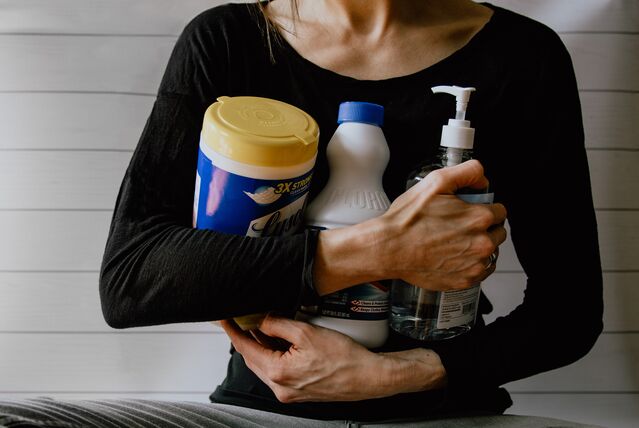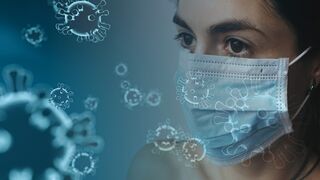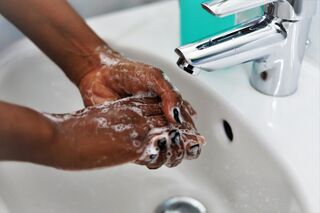Coronavirus Disease 2019
COVID-19 and Security Theater
Are all infection control strategies really productive?
Posted August 7, 2020 Reviewed by Devon Frye

"Security Theater" is a phrase credited to Bruce Schneier and it has been on my mind a lot in recent days. It is generally defined as actions and initiatives that give the illusion or feeling of increased security without providing any benefit that can be empirically demonstrated.
Given the uncertain world in which we currently live, it is completely understandable that we would gravitate towards actions that might seem to minimize the risk of infection. However, we will be most effective in preventing the spread of COVID-19 and in protecting ourselves if we focus our efforts on the few actions with broadly agreed upon direct positive impact.
During the early days of lockdown, I was rubbing grocery packages down with alcohol before putting them away, sure that it was the right thing to do—and now I am arguing with family and friends telling them that doing the same is probably unnecessary, and a potential waste of time and energy.
Somewhere between sharing a pitcher of beer at a crowded party, and locking yourself in your apartment alone, there has to be a reasonable way forward. We keep hearing about the “new normal,” but maybe this is it.
Hopefully, there will be an effective vaccine in a matter of months that enough people will take in order to produce sufficient herd immunity. But until then, we all need to focus on keeping ourselves and each other as safe as possible, and that means not getting distracted by practices that might seem protective, but actually may ultimately be useless, or worse actually increase risk.
Recently, the Atlantic published a piece that very eloquently went through several productive, and other likely futile, means of transmission mitigation—actions aimed to reduce the spread of the virus that causes COVID-19. Overall, the key takeaway point is that not everything we may be doing is truly protective, and the more time we spend on things that are in fact futile, the more we fall into the illusion of perceived protections, potentially devoting less effort to what is truly effective. However, before we think about the motivations behind our actions, we need to ask ourselves: How does the virus spread in the first place?

It is important to remember that asking how something generally DOES happen is not the same as asking how it could POSSIBLY happen. With huge populations—for example, with millions of Americans already infected—there will likely be some anecdotal evidence that can be over-hyped, when in reality the vast majority of transmission events most likely follow similar routes.
Can you get it from a doorknob? Do I need to spray down grocery packaging with disinfectant? These are certainly valid questions, and can be addressed scientifically, but from the point of view of the progression of the pandemic, the huge amounts of data available really seem to point to the following: this is a respiratory virus, and generally speaking, transmission occurs when infectious virus particles enter your nose, mouth, or eyes, and that mostly seems to occur when someone else coughs, sneezes, speaks, or breathes.
Some high profile research suggests that the virus can stay on surfaces for long periods of time. So if someone sneezes in their hand and touches a doorknob, and then you touch it and then rub your eyes, you certainly could get sick.

There are a few very simple things that we all know we can do that would hopefully prevent transmission in the above example—wear a mask or face covering, stay away from people outside the home as much as possible, regularly clean high-touch surfaces, wash your hands thoroughly and often, and don't touch your face, mouth, or eyes. These are the things that everyone should be doing.
It is true, though, that even if we do these things to the best of our abilities we may still get sick. No protection is perfect. Thus, we are all looking for other things to do, and unfortunately, a large number of mostly futile activities and products seem to be filling that gap.
Hand-held personal UV lights and pieces of copper certainly have some potential for killing the virus, under certain conditions. However, although these types of products might make us feel safe, there is little scientific consensus that they actually do.
What security theater can do is distract us from our anxiety and worry, from the unknown and unpredictable nature of this scary new world. Thus, although these things might reduce our anxiety, we need to ask whether they demonstrably decrease risk. Furthermore, if these things divert attention and resources from the simple public health measures we all know work, and provide a false sense of security, they could actually do more harm than good.
So for the most part, all we can do is continue to follow the official guidelines, such as those from the CDC, including covering our faces, maintaining physical distancing, frequent cleaning of high-touch surfaces, and washing our hands.
So should you spray down that bag of potato chips or can of beans? Well it probably couldn’t hurt, but know why you are doing it, and what the actual benefit or impact might be.




